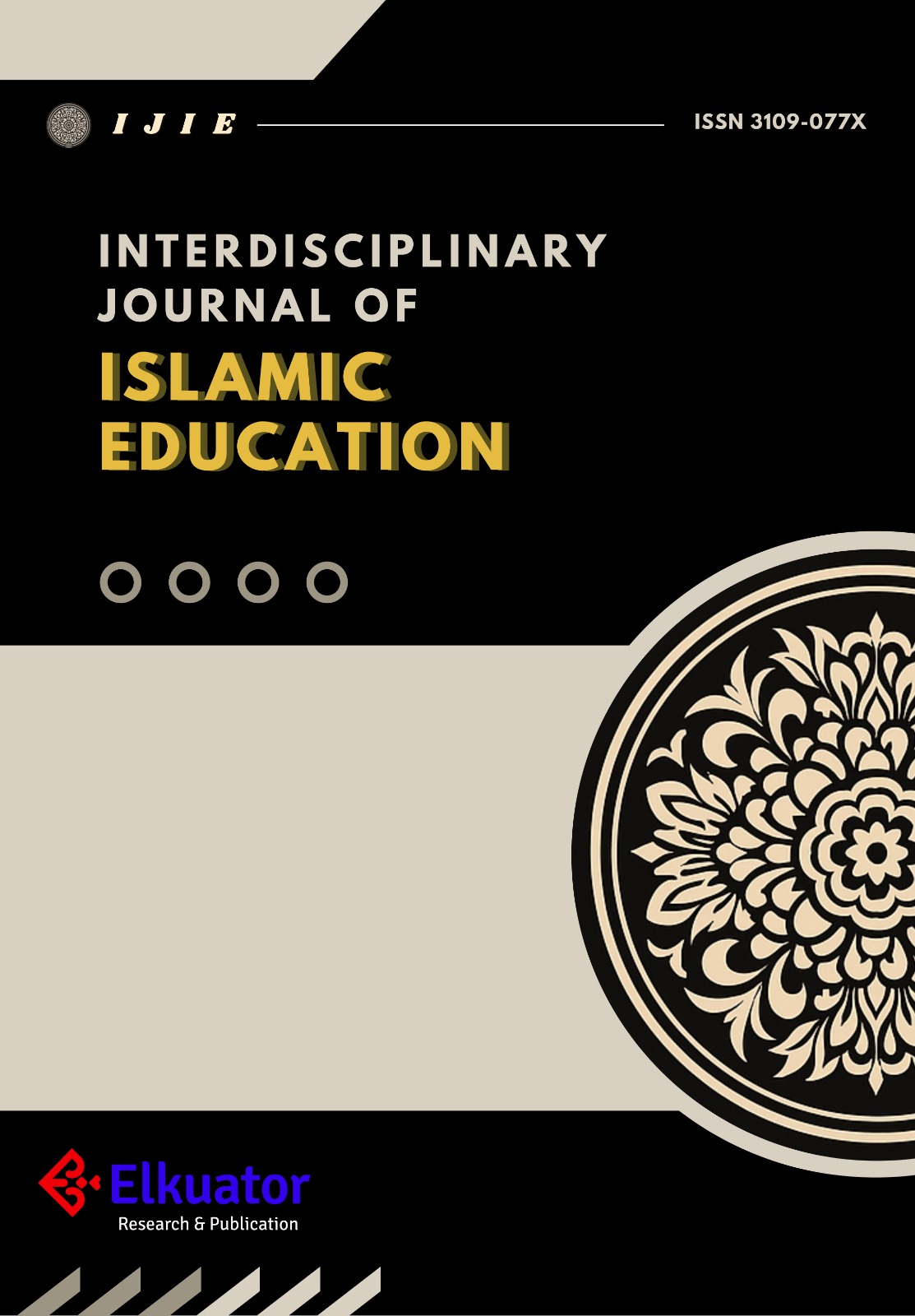Decolonizing Education and the Green Economy: Religious and Indigenous Resistance to Extraction in Indonesia
DOI:
https://doi.org/10.24260/jrd.1.1.40Keywords:
Decolonial Environmentalism, Green Economy, Indigenous Resistance, Religious OrganizationAbstract
Indigenous communities in Indonesia often face serious challenges, especially when dealing with conflicts related to resistance to epistemic dominance in extractive economic practices. This resistance is manifested through a decolonial educational approach rooted in spiritual and religious values. This research uses a qualitative document analysis method, by examining various academic literature, laws and regulations, and empirical case studies. In this study, the form of resistance of indigenous peoples is not only physical or material, but also includes the dimension of knowledge and perspective on nature and development. This study specifically highlights the case of the Mollo and Orang Rimba communities, as well as the role of two major religious organizations in Indonesia, namely Muhammadiyah and Nahdlatul Ulama. All three are understood as a more grounded alternative to the concept of green economy which tends to be state-centric. The ritual practices of indigenous peoples and religious fatwas are a form of profound criticism of the current direction of development. However, contradictions also arise when religious organizations begin to negotiate with community-oriented state policies. The researchers' findings suggest that the decolonization of education and the enforcement of ecological justice are crucial. Both function as a plural and inclusive epistemological foundation in responding to colonialism that has been rooted in the relationship between indigenous peoples, religions, and the state. Therefore, the active involvement of indigenous peoples and religious organizations that prioritize spiritual values as well as a commitment to ecological sustainability and environmental governance has the potential to realize a transformation towards a more just and sustainable life, within the framework of an ecological human rights that respects the rights of indigenous peoples.References
Abdillah, M. (2001). Agama Ramah Lingkungan: Perspektif al-Qur’an. Paramadina.
Afiff, S., & Rachman, N. F. (2019). Agrarian Movements, Citizenship and the Politics of the Environment in Indonesia. In H. Hellman, R. Dhakidae, & O. Törnquist (Eds.), Democracy in Indonesia: from Stagnation to Regression? (pp. 219–240). Palgrave Macmillan. https://doi.org/10.1007/978-3-319-98106-7_9
Afiff, S., & Rachman, N. F. (2019). Institutional Activism: Seeking Customary Forest Rights Recognition from Outside the State. Conservation and Society, 17(2), 135–146. https://doi.org/10.4103/cs.cs_18_24
Agrawal, A. (1995). Dismantling the Divide between Indigenous and Scientific Knowledge. Development and Change, 26(3), 413–439. https://doi.org/10.1111/j.1467-7660.1995.tb00560.x
Ammar, M. (2021). Maqashid Syariah dalam Perlindungan Lingkungan Hidup: Telaah terhadap Fatwa-Fatwa Keagamaan Muhammadiyah dan NU. Jurnal Ilmu Syariah dan Hukum Islam, 19(2), 87–105. https://doi.org/10.24252/alqalam.v19i2a4
Andreotti, V. (2011). (Towards) Decoloniality and Diversality in Global Citizenship Education. Globalisation, Societies and Education, 9(3–4), 381–397. https://doi.org/10.1080/14767724.2011.605323
Bakker, L. (2016). Identifying Indigenous Identity: The Case of the Timor. Bijdragen tot de Taal-, Land- en Volkenkunde, 172(2–3), 218–246. https://doi.org/10.1163/22134379-17202005
Büscher, B., & Fletcher, R. (2020). The Conservation Revolution: Radical Ideas for Saving Nature Beyond the Anthropocene. Verso Books.
Colchester, M. (2011). Palm Oil and Indigenous Peoples in South East Asia. Forest Peoples Programme & International Land Coalition. https://www.forestpeoples.org/sites/fpp/files/publication/2011/11/palm-oil-and-indigenous-peoples-south-east-asia.pdf
Death, C. (2015). Four Discourses of the Green Economy in the Gobal South. Third World Quarterly, 36(12), 2207–2224. https://doi.org/10.1080/01436597.2015.1068110
de Sousa Santos, B. (2014). Epistemologies of the South: Justice Against Epistemicide. Routledge. https://doi.org/10.4324/9781315634876
Escobar, A. (2008). Territories of Difference: Place, Movements, Life, Redes. Duke University Press. https://doi.org/10.1215/9780822389439
Escobar, A. (2018). Designs for the Pluriverse: Radical Interdependence, Autonomy, and the Making of Worlds. Duke University Press. https://doi.org/10.1215/9780822371816
Fanon, F. (1963). The wretched of the Earth (C. Farrington, Trans.). Grove Press.
Fletcher, R., Dressler, W., Büscher, B., & Anderson, Z. R. (2016). Questioning REDD+ and the future of Market-Based Conservation. Conservation Biology, 30(3), 673–675. https://doi.org/10.1111/cobi.12680
Freire, P. (1970). Pedagogy of the oppressed. Herder and Herder.
Gómez-Baggethun, E., & Naredo, J. M. (2015). In Search of Lost Time: The Rise and Fall of Limits to Growth in International Sustainability Policy. Sustainability Science, 10(3), 385–395. https://doi.org/10.1007/s11625-015-0308-6
Hadiz, V. R. (2017). Imagine All the People? Mobilising Islamic Populism for Right-Wing Politics in Indonesia. Journal of Contemporary Asia, 47(1), 100–115. https://doi.org/10.1080/00472336.2016.1208100
Haq, S., Lubis, S., Raqieb, A., & Agustin, S. (2024). Eco Sufism of Kajang Tribe in the Tradition of “Pasang Rikajang” Indigenous Community of Sulawesi, Indonesia. Mimbar Agama dan Budaya, 41(2), 196–204. http://dx.doi.org/10.15408/mimbar.v41i2.41541
Indrarto, G. B., Murharjanti, P., Khatarina, J., Pulungan, I., Ivalerina, F., Rahman, J., Prana, M. N., Resosudarmo, I. A. P., & Muharrom, E. (2012). The Context of REDD+ in Indonesia: Drivers, agents and Institutions. CIFOR. https://doi.org/10.17528/cifor/003876
Kompas. (2024). NU dan Muhammadiyah yang disatukan Izin Tambang. Kompas. https://nasional.kompas.com/read/2024/07/29/09223511/nu-dan-muhammadiyah-yang-disatukan-izin-tambang
Larson, A. M., & Soto, F. (2008). Decentralization of Natural Resource Governance Regimes. Annual Review of Environment and Resources, 33, 213–239. https://doi.org/10.1146/annurev.environ.33.020607.095522
Latour, B. (2004). Why has Critique Run out of Steam? From Matters of Fact to Matters of Concern. Critical Inquiry, 30(2), 225–248. https://doi.org/10.1086/421123
Li, T. M. (2007). The will to Improve: Governmentality, Development, and the Practice of Politics. Duke University Press. https://doi.org/10.2307/j.ctv11smn6b
Li, T. M. (2016). Land's end: Capitalist Relations on an Indigenous Frontier. Duke University Press. https://doi.org/10.2307/j.ctv11cw1sg
Mignolo, W. D. (2009). Epistemic Disobedience, Independent Thought and Decolonial Freedom. Theory, Culture & Society, 26(7–8), 159–181. https://doi.org/10.1177/0263276409349275
Mignolo, W. D., & Walsh, C. E. (2018). On Decoloniality: Concepts, analytics, praxis. Duke University Press. https://doi.org/10.1215/9780822371779
Mulyani, M., & Jepson, P. (2015). REDD+ and Forest Governance in Indonesia: A multistakeholder Study of Perceived Challenges and Opportunities. Journal of Environment and Development, 24(3), 261–283. https://doi.org/10.1177/1070496515589586
Muntholib, A., Wardhani, R. K., & Suharyanto, T. (2020). Tradisi dan Adaptasi Masyarakat Adat Orang Rimba terhadap Perubahan Lingkungan Hutan. Jurnal Masyarakat dan Budaya, 22(1), 71–88. https://doi.org/10.14203/jmb.v22i1.548
Myers, R., Larson, A. M., Ravikumar, A., Kowler, L. F., & Yang, A. L. (2017). Messiness of Forest Governance: How Technical Approaches Suppress Politics in REDD+ and Conservation Projects. Global Environmental Change, 39, 275–289. https://doi.org/10.1016/j.gloenvcha.2016.06.010
Nasir, M. A. (2022). Fiqh lingkungan dalam Praktik: NU dan Gerakan Konservasi Berbasis Pesantren. Mimbar Agama dan Budaya, 39(1), 43–58. https://doi.org/10.29313/mimbar.v39i1.7694
Nasr, S. H. (1996). Man and nature: The Spiritual Crisis of Modern Man. ABC International Group.
Padawangi, R. (2014). Weaving Resistance in Timor: Aleta Baun’s Ecofeminist Movement. In S. Harsono (Ed.), Ekofeminisme Indonesia: Kisah perempuan pejuang lingkungan (pp. 39–52). Yayasan Jurnal Perempuan.
Pudjiastuti, S. R., Iriansyah, H. S., & Yuliwati, Y. (2021). Program Eco-pesantren sebagai Model Pendidikan Lingkungan Hidup. Jurnal Abdimas Prakasa Dakara, 1(1), 29–37. https://doi.org/10.37640/japd.v1i1.942
Quijano, A. (2000). Coloniality of power, Eurocentrism, and Latin America. Nepantla: Views from South, 1(3), 533–580.
Safi’i, M. (2020). Fatwa Lingkungan Hidup Muhammadiyah dan Peranannya dalam Pengembangan Pendidikan Ekologi. Jurnal Al-Tahrir, 20(1), 155–178. https://doi.org/10.21154/altahrir.v20i1.1985
Shiva, V. (1989). Staying alive: Women, ecology and development. Zed Books.
Sundar, N. (2000). Unpacking the “Joint” in Joint Forest Management. Development and Change, 31(1), 255–279. https://doi.org/10.1111/1467-7660.00152
Syarif, A. (2020). Eco-pesantren dan Pendidikan Lingkungan Hidup: Integrasi Nilai-nilai Islam dan Ekologi. Tarbawi: Jurnal Keilmuan Manajemen Pendidikan, 6(2), 123–134. https://doi.org/10.32678/tarbawi.v6i02.3620
United Nations Environment Programme (UNEP). (2011). Towards a Green Economy: Pathways to Sustainable Development and Poverty Eradication. https://www.unep.org/resources/report/towards-green-economy-pathways-sustainable-development-and-poverty-eradication
World Resources Institute. (2021). Faith and Forest: The Role of Religious Communities in Tropical Forest Protection. https://www.wri.org/insights/faith-and-forests
Wulan, R. (2019). Perempuan Mollo dan Praktik Perlawanan Ekofeminisme. Jurnal Perempuan, 24(2), 32–45. https://doi.org/10.34309/jp.v24i2.234
Downloads
Published
Issue
Section
Copyright and License
Copyright (c) 2025 Sopian Lubis, Husayn Muhyideen Ali, Ali Ali (Author)

This work is licensed under a Creative Commons Attribution-NonCommercial 4.0 International License.









